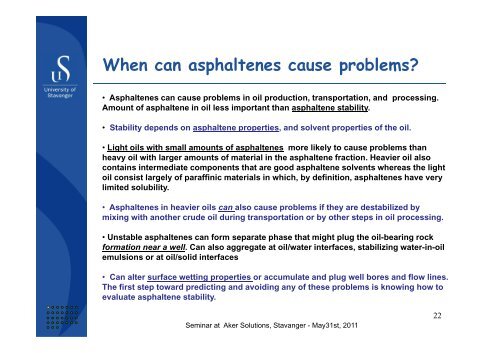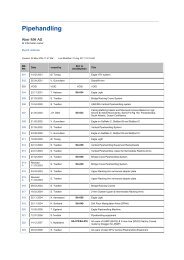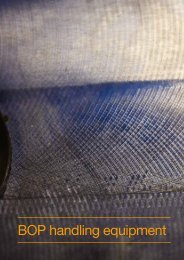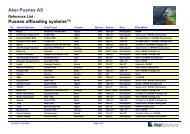Flow Assurance and Multiphase flow - part 2 By Prof ... - Aker Solutions
Flow Assurance and Multiphase flow - part 2 By Prof ... - Aker Solutions
Flow Assurance and Multiphase flow - part 2 By Prof ... - Aker Solutions
Create successful ePaper yourself
Turn your PDF publications into a flip-book with our unique Google optimized e-Paper software.
When can asphaltenes cause problems?<br />
• Asphaltenes can cause problems in oil production, transportation, <strong>and</strong> processing.<br />
Amount of asphaltene in oil less important than asphaltene stability.<br />
• Stability depends on asphaltene properties, <strong>and</strong> solvent properties of the oil.<br />
• Light oils with small amounts of asphaltenes more likely to cause problems than<br />
heavy oil with larger amounts of material in the asphaltene fraction. Heavier oil also<br />
contains intermediate components that are good asphaltene solvents whereas the light<br />
oil consist largely of paraffinic materials in which, by definition, asphaltenes have very<br />
limited solubility.<br />
• Asphaltenes in heavier oils can also cause problems if they are destabilized by<br />
mixing with another crude oil during transportation or by other steps in oil processing.<br />
• Unstable asphaltenes can form separate phase that might plug the oil-bearing rock<br />
formation near a well. Can also aggregate at oil/water interfaces, stabilizing water-in-oil<br />
emulsions or at oil/solid interfaces<br />
• Can alter surface wetting properties or accumulate <strong>and</strong> plug well bores <strong>and</strong> <strong>flow</strong> lines.<br />
The first step toward predicting <strong>and</strong> avoiding any of these problems is knowing how to<br />
evaluate asphaltene stability.<br />
Seminar at <strong>Aker</strong> <strong>Solutions</strong>, Stavanger - May31st, 2011<br />
22

















